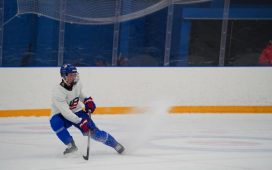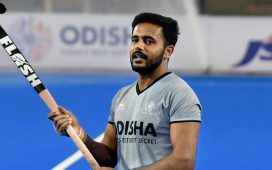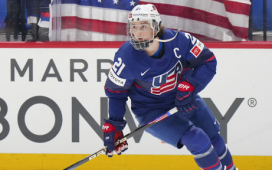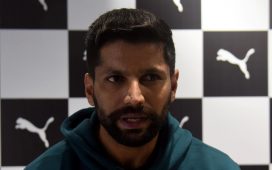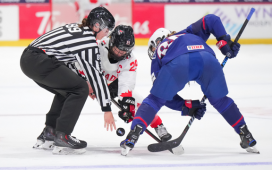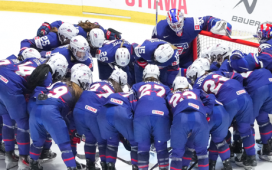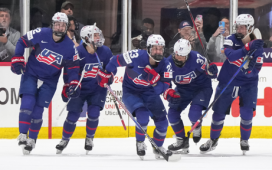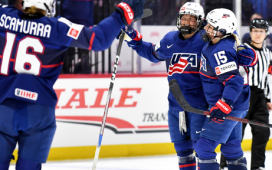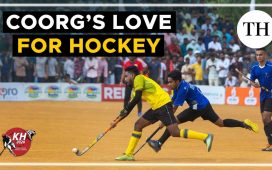Few teams have been as a good as Russia in World Junior Championship history.
Since becoming its own nation in 1993, Russia has finished without a medal just four times in the past 27 WJCs. But of those medals, Russia has just one gold medal since 2010, and only three in the lifespan of any member of the 2020 roster. The Russians are always projected to do well, but the country just hasn’t done enough to secure the top step on the medal podium. Russia brought a strong group in 2019, but a 2-1 loss to the United States in the semifinal relegated them to the bronze-medal game, which Russia won. Seven players can return from the 2019 team and should be impact players on a team with impressive depth at all positions. That’s a good situation to be in.
Many of Russia’s best played in the World Junior Summer Showcase in early August, but it did win the Four Nations tournament in Perm, Russia, the second notable U-20 tournament of the 2019-20 season. Compared to Sweden and Finland, the Russians brought a roster that looked more like what the real team will look like come December, minus a few players participating in KHL training camps and whatnot.
Let’s not waste time. Here’s a late-summer look at what Russia’s roster could look like ahead of the CIBC Canada/Russia Series and 2020 World Junior Championship later this season:
FORWARDS
Grigori Denisenko – Ivan D. Morozov – Pavel Dorofeyev
Kirill Marchenko – Danil Savunov– Vasili Podkolzin
Yegor Spiridonov – Ilya Nikolayev – Pavel Rotenberg
Rodion Amirov – Dmitri Voronkov – Nikita Rtishchev
Yegor Stepanov
If you watched the Four Nations tournament, you would have loved the chemistry for the top line of Denisenko, Morozov and Dorofeyev. It seemed like anytime they touched the ice, magic would happen: the trio brought good vision, speed and puck smarts around the crease, generating multiple dangerous scoring chances in each game. It’s unlikely they’ll be split up at the CIBC Canada/Russia Series in November and will be the top group come December, especially with the first two having prior experience at the world junior last year.
Podkolzin was a polarizing player last year – injury rumors during the U-18 World Championship, where he had just one goal, didn’t help – but the Canucks prospect looked revamped in Perm. To keep it short, all he did was create scoring chances for himself and his teammates. His passes connected more often than usual and was typically Russia’s most noticeable forward. He blocked a shot off his right hand against the Czech Republic, but he didn’t miss a beat and helped lead the way.
The winger he clicked with the most was Marchenko, who, like Podkolzin, spent the tournament playing on the off-wing. Marchenko, a Columbus Blue Jackets prospect, is known for his powerful wrist shot and his splendid puck control, but he’s often the finisher for whatever line he plays on. He was quiet at the 2019 World Junior Championship with just one goal, but he had a rather small role. Give him a top-six spot with players he knows and his true potential will be unlocked. Savunov helped bring the line together down the middle and clicked to where he’ll be a good fit for the real tournament later this year.
Russia’s third line is a group filled with energy and skill. Kovalenko played hurt in 2019 but was so noticeable with the puck, spending significant time around the net and generating scoring chances. Spiridonov is the worst skater on the line, but he’s a reliable backchecker and can kill penalties, something Russia will lean on him for. Nikolayev is still a work in progress and will need a good start to the season to solidify his spot in the lineup, but he was one of Russia’s best U-18 players internationally last season with 22 points in 27 games. Look for him to be counted on for playmaking purposes if he makes the squad.
The Russians don’t typically give many opportunities to young players (Podkolzin, however, was utilized more last year than other draft-eligibles in recent years). So it will be interesting to see how 2020 draft prospect Amirov fits into the equation. Amirov may have the quickest hands in the draft and makes the most of his opportunities in close. Amirov was born in October 2001, so he’s actually not much younger than someone like Podkolzin, despite missing the cutoff for the 2019 draft by half a month. He won’t have a big role for the Russians this year, but look for it to be a trial run before getting his big break in 2021.
DEFENSEMEN
Danila Zhuravlyov – Alexander Romanov
Daniil Misyul – Daniil Valitov
Danila Galenyuk– Anton Malyshev
Bogdan Zhilyakov
With just two returning defensemen — Zhuravlyov and Romanov – the Russians will rely on a new crop to lead the charge from the back end. Zhuravlyov, a Colorado Avalanche pick in 2018 (146th overall), emerged as a safe, defensively responsible option that won’t put up high point totals but won’t be the reason your opponents score. Zhuravlyov is best when paired with a defenseman who isn’t afraid to rush the puck and force chances at both ends of the ice – Romanov, in this case. The Montreal Canadiens prospect played some of his best hockey at the 2019 World Junior Championship, forcing his way into key minutes while putting up eight points in seven games.
In reality, it feels like a crapshoot after the top pair. Part of that is because Russia tends to shuffle its defense group around at the various tournaments before the real deal gets underway. Valitov has eight games of KHL experience under his belt and will get a more extended look in Yekaterinburg this season. Otherwise, he’ll continue to put a beating on the rest of the MHL. Considered a draft sleeper over the past few years, Galenyuk is a physical, shutdown defenseman who can allow Malyshev or Valitov to be a bit more creative with the puck.
Perhaps the most intriguing name on the blueline is Misyul, New Jersey’s third-round pick in 2019 (70th overall). Misyul is an excellent skater who impressed in limited KHL action with Yaroslavl. In fact, Yaroslav’s coaching staff liked him enough to give him increasing minutes during the playoffs, despite only three games of regular season experience beforehand. He’s still a project player and might not produce high-end offensive numbers, but he can run a power play and has good size to work with.
GOALTENDERS
Amir Miftakhov
Yaroslav Askarov
Daniil Isayev
Miftakhov was Russia’s third goalie at the world junior last year and didn’t start a game, but he’ll be the go-to man for the entire tournament this year. At the Four Nations event, Miftakhov played lights out, stealing the show against the Czech Republic in the opening game before shutting out Sweden. Miftakhov has experience at the U-20 level and will have the edge in net. But, of course, counting out Askarov would be a big mistake. Askarov has been the best goaltender at every notable tournament he has ever played for Russia, giving no mercy to whoever has had to back him up. He is good enough to be a potential top-10 pick in this year’s draft, something no goalie has done since Carey Price in 2005. He’s the real deal and will earn a few starts along the way.
Put in either of those two choices and you’ve got yourself a winning netminder.
PREVIOUS: Canada | Finland | Sweden | USA
Want more in-depth features, analysis and an All-Access pass to the latest content? Subscribe to The Hockey News magazine.
